Here are five world-famous autobiographies that have received widespread acclaim:
“The Diary of a Young Girl” by Anne Frank: This poignant and influential book is the diary of Anne Frank, a Jewish girl who went into hiding with her family during the Nazi occupation of the Netherlands. Her diary offers a deeply personal account of her experiences and thoughts while living in confinement. It has become an enduring symbol of the Holocaust and has touched the hearts of millions worldwide.
“The Autobiography of Malcolm X” by Malcolm X and Alex Haley: This powerful autobiography chronicles the life of Malcolm X, a prominent African-American civil rights activist. Malcolm X’s personal journey from his troubled youth to his conversion to Islam and subsequent role as a prominent figure in the Nation of Islam provides a profound insight into racial discrimination, black identity, and social justice.
“Long Walk to Freedom” by Nelson Mandela: Nelson Mandela, the iconic South African anti-apartheid leader and the country’s first black president, tells his remarkable life story in this autobiography. “Long Walk to Freedom” covers his early life, activism, imprisonment, and eventual triumph over apartheid. Mandela’s unwavering commitment to justice, reconciliation, and freedom has made this book an inspiration to millions around the world.
“The Story of My Experiments with Truth” by Mahatma Gandhi: In this autobiography, Mahatma Gandhi, the leader of India’s independence movement, shares his personal journey and philosophical insights. He reflects on his struggles, principles, and experiments with nonviolent resistance, offering profound lessons in moral and political leadership. Gandhi’s autobiography has had a lasting impact on the fields of activism, civil rights, and nonviolence.
“I Know Why the Caged Bird Sings” by Maya Angelou: Maya Angelou, an acclaimed poet, memoirist, and civil rights activist, recounts her childhood and adolescence in this autobiographical work. She explores themes of racism, trauma, identity, and resilience, and her poetic writing style creates a compelling narrative that resonates with readers. “I Know Why the Caged Bird Sings” is the first volume of Angelou’s seven-part autobiographical series.
“
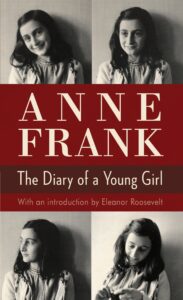
“The Diary of a Young Girl” is a remarkable autobiography that documents the life of Anne Frank, a Jewish girl who went into hiding with her family during the Nazi occupation of the Netherlands in World War II. Anne Frank received a diary as a gift on her 13th birthday, and she began recording her experiences and thoughts in it.
The diary covers a period of two years, from 1942 to 1944, during which Anne and her family lived in hiding in a secret annex above her father’s office building in Amsterdam. Through her diary, Anne provides an intimate and honest account of her daily life, her fears, her dreams, and her reflections on the world around her.
Anne Frank’s writing captures the challenges, hopes, and frustrations of living in confinement, as well as her growing awareness of the persecution of Jews and the horrors of the Holocaust. Her diary also delves into her relationships with the other occupants of the annex, including her sister Margot, her parents, and the Van Pels family and Fritz Pfeffer, who joined them in hiding.
Tragically, the family was discovered by the Nazis in 1944 and sent to concentration camps. Anne Frank died of typhus in Bergen-Belsen concentration camp in early 1945, just a few weeks before the camp’s liberation. Her father, Otto Frank, survived and found her diary after the war, fulfilling Anne’s dream of becoming a writer.
“The Diary of a Young Girl” was first published in 1947 and has since been translated into numerous languages. It has become one of the most widely read books in the world, touching the hearts of readers and serving as a testament to the human spirit, resilience, and the enduring power of hope. Anne Frank’s diary provides an invaluable historical record and a deeply personal account of the Holocaust.
“The Autobiography of Malcolm X” by Malcolm X and Alex Haley
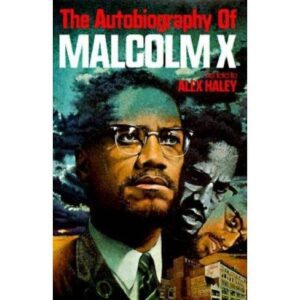
“The Autobiography of Malcolm X” is a captivating autobiography that chronicles the life and transformation of Malcolm X, an influential African-American civil rights activist. The book is a collaboration between Malcolm X and writer Alex Haley, who conducted a series of interviews with Malcolm X and then shaped them into a compelling narrative.
Malcolm X’s autobiography covers his early years, his experiences with racism and discrimination, his time in prison, and his emergence as a prominent figure in the Nation of Islam, a Black separatist movement. He shares his journey from a troubled youth involved in criminal activities to his conversion to Islam while incarcerated, which became a turning point in his life.
The autobiography explores Malcolm X’s evolving ideologies and beliefs, including his advocacy for Black pride, self-defense, and the pursuit of social and political equality. It delves into his experiences as a charismatic speaker and leader within the Nation of Islam, as well as his later break with the organization and his embrace of Sunni Islam during his travels to Africa and the Middle East.
Malcolm X’s autobiography provides an unflinching examination of racial injustice in America, highlighting the systemic oppression faced by African Americans. It addresses themes of identity, religion, activism, and the struggle for civil rights. The book’s raw and honest portrayal of Malcolm X’s personal journey and his commitment to the fight for equality has made it a significant literary and historical work.
“The Autobiography of Malcolm X” was published in 1965, shortly after Malcolm X’s assassination. It has since become a classic in African-American literature and a seminal work in the field of civil rights. The book continues to inspire and provoke discussions on race, identity, and social justice, leaving a lasting impact on readers worldwide.
“Long Walk to Freedom” by Nelson Mandela
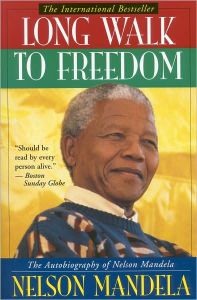
“Long Walk to Freedom” is the autobiography of Nelson Mandela, the renowned South African anti-apartheid activist and the country’s first black president. The book offers a comprehensive account of Mandela’s life, from his childhood in a rural village to his struggle against apartheid, his imprisonment for 27 years, and his eventual presidency.
Mandela’s autobiography provides a vivid portrayal of the racial segregation and oppression under apartheid, detailing his early activism as a member of the African National Congress (ANC) and his involvement in various campaigns and protests. It delves into his role as a leader of the ANC’s armed wing, Umkhonto we Sizwe, and his commitment to nonviolent resistance and the pursuit of equality and justice.
The book offers an intimate look at Mandela’s personal life, including his marriages, family relationships, and friendships. It also explores his complex relationship with his captors and his fellow prisoners during his time in Robben Island prison, where he spent the majority of his imprisonment.
“Long Walk to Freedom” is not just a personal memoir but also a reflection on the broader struggle for freedom in South Africa. Mandela emphasizes the importance of reconciliation and forgiveness in the face of injustice, and he shares his vision for a united and democratic South Africa.
The autobiography was first published in 1994, shortly after Mandela became president, and has been widely acclaimed for its eloquence, honesty, and inspirational message. “Long Walk to Freedom” has become an iconic book, recognized for its profound impact on the fight against apartheid and its embodiment of Mandela’s unwavering commitment to justice and reconciliation.
“The Story of My Experiments with Truth” by Mahatma Gandhi
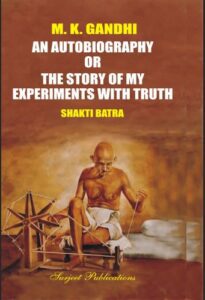
“The Story of My Experiments with Truth” is the autobiography of Mohandas Karamchand Gandhi, popularly known as Mahatma Gandhi. The book provides a deeply introspective account of Gandhi’s life, his philosophical and spiritual evolution, and his experiences in the Indian independence movement.
Gandhi’s autobiography begins with his childhood and upbringing in Gujarat, India, and traces his journey through his education in England, his early struggles as a lawyer in South Africa, and his eventual return to India. It explores the significant events and influences that shaped Gandhi’s beliefs, including his encounters with racial discrimination in South Africa, his study of religious texts, and his commitment to the principles of truth, nonviolence, and Satyagraha (passive resistance).
The book delves into Gandhi’s experiments with various aspects of his life, such as vegetarianism, celibacy, and simplicity. He discusses his involvement in various nonviolent protests and civil disobedience campaigns, including the Salt March and the Quit India movement, as well as his time spent in prison for his activism.
Gandhi’s autobiography offers profound insights into his philosophical and moral convictions, as well as his reflections on the challenges and successes of the Indian independence struggle. It explores his ideas on social reform, interfaith harmony, and the importance of self-discipline and self-restraint.
“The Story of My Experiments with Truth” was originally written in Gujarati and later translated into English. It was published in various volumes between 1925 and 1929. The book remains a seminal work in the field of nonviolent resistance and has inspired countless individuals and movements worldwide. Gandhi’s autobiography continues to be regarded as a testament to the power of truth, simplicity, and nonviolence in the pursuit of justice and freedom.
“I Know Why the Caged Bird Sings” by Maya Angelou
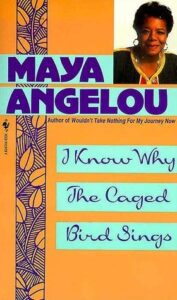
“I Know Why the Caged Bird Sings” is the first volume of Maya Angelou’s autobiographical series. This captivating memoir explores Angelou’s early life, from her childhood in the racially segregated South of the United States to her adolescence and early adulthood.
The book delves into Angelou’s experiences growing up in the Jim Crow era, where she faced racism, trauma, and adversity. It covers her childhood in Stamps, Arkansas, living with her grandmother, and later moving to St. Louis to live with her mother. Angelou shares poignant and vivid accounts of the challenges she faced, including the effects of segregation, poverty, and sexual abuse.
Angelou’s autobiography highlights the transformative power of literature and her love for books and poetry. She reflects on the role of education, her resilience, and her determination to overcome the obstacles that she encountered. The title of the book is drawn from a poem by Paul Laurence Dunbar, symbolizing the yearning for freedom and expression despite being confined.
“I Know Why the Caged Bird Sings” is also a coming-of-age story that explores Angelou’s journey towards self-discovery, self-acceptance, and empowerment. It celebrates the strength of the human spirit and the power of storytelling as a means of healing and transformation.
The book was published in 1969 and received critical acclaim for its honesty, lyrical prose, and its exploration of important themes such as race, identity, and resilience. “I Know Why the Caged Bird Sings” has become a classic work of literature and a testament to Maya Angelou’s indomitable spirit and her contributions as a writer, poet, and civil rights activist.
These autobiographies have had a significant impact on literature, history, and society, offering powerful insights into the lives and experiences of their authors.











1 thought on “Unveiling the Tapestry of Lives: Top 5 World Autobiographies That Inspire and Illuminate”